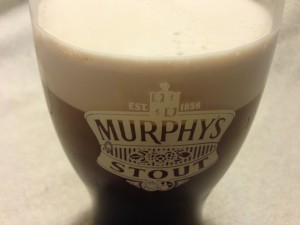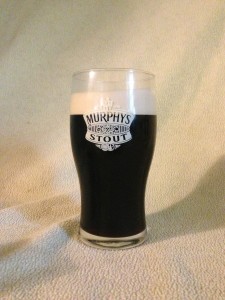This is my dry stout recipe, formulated for a countertop partial mash. (For more on dry stouts, see the series of articles on that beer style) In this formulation, the brewer mashes 4.0 lbs. (1.8 kg) of grain in a 2-gallon (~8-L) beverage cooler. An option to mash 6.0 lbs. (2.7 kg) in a 3-gallon (~11-L) cooler is also given. In the 2-gallon (~8-L) version, 78% of the fermentables come from the mash. In fact, in both version, all of the malt extract is withheld until the end of the boil.
I have been posting a series of recipes formulated as partial mashes because I feel that partial mash homebrews have more base malt aroma than recipes in which only specialty grains are steeped. If you’re an extract beer thinking of trying all-grain brewing, this is a good recipe to try as the wort is close to being made completely from grains (especially if you try the 3-gallon (11-L) cooler option).
A 1-qt. (1-L) yeast starter is recommended for this beer, but if you get a fresh tube of yeast, you can get away without making a yeast starter.
The Cure from Cork
Dry stout
by Chris Colby
Partial mash (countertop); English units
DESCRIPTION
This is a dry stout reminiscent of Murphy’s Pub Draught, now sold in widget cans. Murphy’s stout is slightly mellower — a little less bitter with a hint of chocolate and caramel in the malt — than Guinness, and (in my opinion) also tastes better when carbonated with CO2, as opposed to pushed with beer gas. If you like session ales — and are disappointed you can’t find Murphy’s except in widget cans — this is a great recipe to try.
INGREDIENTS (for 5 gallons)
Water
80 ppm calcium (Ca+2)
20 ppm magnesium (Mg+2)
240 ppm bicarbonate (HCO3–)
Malts and Other Fermentables (for an OG of 1.038 at 65% extract efficiency and an SRM of 41)
3 lb. 1 oz. English pale ale malt
2.0 oz. dark crystal malt (90 °L)
3.0 oz. chocolate malt
10 oz. roasted barley (500 °L)
12 oz. cane sugar
1 lb. 6 oz. light dried malt extract
Hops (for 34 IBU total)
Target hops (34 IBUs)
0.9 oz. (at 10% alpha acids), boiled for 60 minutes
Yeast (to attenuate to FG 1.007, for an ABV of 4.1%)
White Labs WLP007 (Dry English Ale) yeast
(a 1-qt. yeast starter is suggested)
Other
0.25 tsp. yeast nutrients, boiled for 15 minutes
4 oz. corn sugar (to prime bottles for 2.0 volumes of CO2)
PROCEDURE
Make yeast starter 2 days ahead of time. If milling your own grains, crush the dark grains separately from the pale malt. (You will likely need to tighten the mill gap a bit for the smaller dark grains.) Mix the crushed grains in a large steeping bag. (You will have 4 pounds of grain total). In your brewpot, heat 5.5 qts. of brewing liquor to 161 °F. Submerge the grain bag in your brewpot. Mash at 150 °F for 60 minutes, stirring and heating briefly every 10 minutes to maintain the mash temperature. In a separate pot, heat 5.0 qts. of water to 170 °F. When the mash is done, heat it (grains and wort) to 170 °F for a mash out. Lift bag and let drip into brewpot until you can move it over to the cooler without splattering too much wort. Scoop or pour the wort from the brewpot into the cooler. Recirculate the wort until it clears a bit, then run off. Sparge steadily over 60 minutes (collect about a cup of wort from the cooler every 90 seconds) to collect about 10 qts. total. Heat the wort as you collect it. Aim to hit boiling right at the end of wort collection. Add about 1.0 qt. of water to the brewpot, to make 3.0 gallons when you’re done collecting the wort. Bring the wort to a boil. Add the hops and boil wort for 60 minutes. Add yeast nutrients at the time indicated. Do not let boil volume drop below 3.0 gallons. (Alternately, begin by boiling 3.5–4.0 gallons and boil down to 3.0 gallons.) Keep the boil topped up with boiling water as you go. Stir in the malt extract and sugar in the last 10 minutes of the boil. (Tips on adding extract during the boil.) Chill wort to 68 °F, then rack to fermenter. Add water to make 5.0 gallons, aerate wort thoroughly, and pitch yeast. Ferment at 70 °F. Carbonate to 2.0 volumes of CO2. (You can keg this and push with nitrogen if you like, but I think it tastes better with “normal” (CO2) bubbles.)
3-gallon Cooler Option:
Increase the amount of UK pale ale malt to 5 lb. 1 oz. (2.3 kg) and decrease the amount of dried malt extract to 5.0 oz. (140 g). Mash in 8.25 qts. (7.8 L) of water. Sparge with 7.5 qts. (7.0 L) of water.
The Cure from Cork
Dry stout
by Chris Colby
Partial mash (countertop); metric units
INGREDIENTS (for 19 L)
Water
80 ppm calcium (Ca+2)
20 ppm magnesium (Mg+2)
240 ppm bicarbonate (HCO3–)
Malts and Other Fermentables (for an OG of 1.038 at 65% extract efficiency and an SRM of 41)
1.4 kg English pale ale malt
57 g dark crystal malt (90 °L)
85 g chocolate malt
280 g roasted barley (500 °L)
340 g cane sugar
620 g light dried malt extract
Hops (for 34 IBU total)
Target hops (34 IBUs)
26 g (at 10% alpha acids), boiled for 60 minutes
Yeast (to attenuate to FG 1.007, for an ABV of 4.1%)
White Labs WLP007 (Dry English Ale) yeast
(a 1-L yeast starter is suggested)
Other
0.25 tsp. yeast nutrients, boiled for 15 minutes
110 g corn sugar (to prime bottles for 2.0 volumes of CO2)
PROCEDURE
Make yeast starter 2 days ahead of time. If milling your own grains, crush the dark grains separately from the pale malt. (You will likely need to tighten the mill gap a bit for the smaller dark grains.) Mix the crushed grains in a large steeping bag. (You will have 1.8 kg of grain total). In your brewpot, heat 5.2 L of brewing liquor to 72 °C. Submerge the grain bag in your brewpot. Mash at 66 °C for 60 minutes, stirring and heating briefly every 10 minutes to maintain the mash temperature. In a separate pot, heat 4.7 L of water to 77 °C. When the mash is done, heat it (grains and wort) to 77 °C for a mash out. Lift bag and let drip into brewpot until you can move it over to the cooler without splattering too much wort. Scoop or pour the wort from the brewpot into the cooler. Recirculate the wort until it clears a bit, then run off. Sparge steadily over 60 minutes (collect about a cup of wort from the cooler every 90 seconds) to collect about 10 L total. Heat the wort as you collect it. Aim to hit boiling right at the end of wort collection. Add about 1 L of water to the brewpot, to make about 11 L when you’re done collecting the wort. Bring the wort to a boil. Add the hops and boil wort for 60 minutes. Add yeast nutrients at the time indicated. Do not let boil volume drop below 11 L. Keep the boil topped up with boiling water as you go. (Alternately, begin by boiling 13–15 L and boil down to 11 L.) Stir in the malt extract and sugar in the last 10 minutes of the boil. (Tips on adding extract during the boil.) Chill wort to 20 °C, then rack to fermenter. Add water to make 19 L, aerate wort thoroughly, and pitch yeast. Ferment at 21 °C. Carbonate to 2.0 volumes of CO2. (You can keg this and push with nitrogen if you like, but I think it tastes better with “normal” (CO2) bubbles.)
—
Related articles



Speak Your Mind